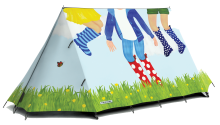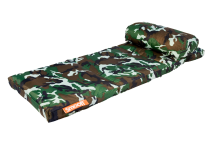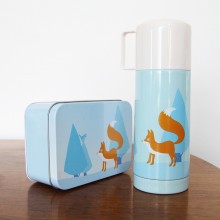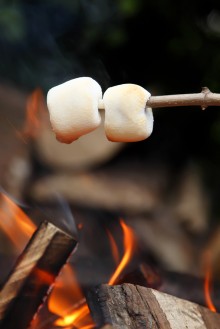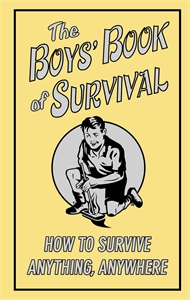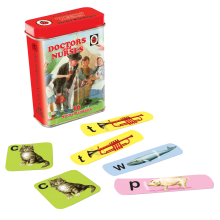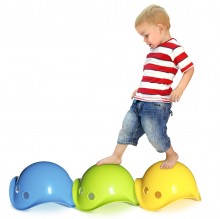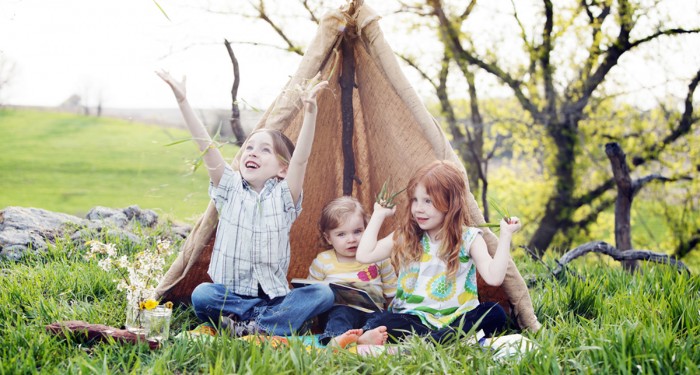
The 12 Camping Essentials
by Suzanne Milne on 18/09/2013Camping, camping, camping. There is an art to camping, and often just the thought of all the preparation is enough to put first-timers off. After all, you could pack the entire kitchen sink and still find yourself up the creek without a paddle (so to speak), so here is our Super Basic Beginner’s Guide to the 12 absolute essentials for a camping trip with kids, then simply add or subtract according to the demands of your camping site and your mode of transport… After all, if you have to walk some distance to your actual camping destination, you’ll quickly want to divide all your needs (except food) in half… then halve that, and find the smallest and lightest possible versions of each and every thing on your list to pack into a really good backpack!
1. To state the obvious – your tent and the equipment you’ll need for pitching it! If it has been a long time since you last pitched your tent, do a trial-run at home the weekend before your departure. You just never know what may have gone missing in the intervening years… There may also be need for repairs, and the last thing you want is to find yourself a hundred miles from home with a leaky roof. Duct tape, bunji cords, a few metres of rope and a some extra ground pegs are also a good idea just in case things go wrong on the fly.
2. Sleeping bags and mattresses. You want this to be fun, not freezing. So invest in a good sleeping bag – it will see you through all manner of outings and events with your children through the years. And if you really want to enjoy a good night’s sleep, even the thinnest of mattresses will avoid the kids tossing and turning like little princes and princesses atop a pea (even the smallest pebble can make the night a long and miserable affair). While it is by no means essential, you might also like to pack a pillow or two, just in case your mattresses all start feeling just a little too hard.
3. Groundsheet/s. Having a few sturdy plastic groundsheets can be a blessing if the weather turns more than a little mucky. This will allow for somewhere to clean up outdoors without being knee deep in mud.
4. Food and cooking utensils. Campfire cooking is an entirely different domain to cooking on your induction cooktop at home. Think up a handful of meals that will literally cook themselves – baked potatoes, boiled eggs, beans, beans and more beans – then think about a few additions to turn them from bland to gourmet (well in camping terms anyhow)… onions, garlic, cheese.
And don’t forget those ingredients that will make for memorable moments around the campfire – marshmallows, the ingredients for dampers on a stick (flour, butter, salt and water – and jam), corn on the cob (but in this instance wrapped in foil)
Also make sure you pack plenty of bottled water – while you can boil and purify natural water (yes, you should pack plenty of the purifying sachets too), you never know when there may have been a recent storm that might make the water undrinkable. For cooking equipment, you will need at least two pots, as well as plenty of kitchen foil for wrapping up those baked potatoes and other veggies you want to cook hãngi-style. And always, always pack at least two pocket-knives (just in case one gets lost); you will need it on an hourly basis! For your drive-up campsite, a waffle-iron will also get daily use (as long as you’ve packed a loaf of bread), and make sure you take along at least a handful of stirring devices and cutlery (although it is an interesting experiment trying to eat with your hands, and sipping your soup from a cup for a whole week). Which reminds me, a thermos is another thing for your camping bag (or car at this rate); it might not be used for actual cooking, but if you’ve made up a soup on the campfire, this can keep it safely stored for a day of walking. Furthermore, be sure to pack a goodly sum of bars – muesli, chocolate, energy. These will always all get eaten!
5. Matches. Obviously, you are going to need to actually start that fire if you are going to cook anything… so don’t forget matches, magnifying glasses (and perhaps even your copy of The Boy’s Book of Survival by Guy Campbell from Buster Books).
6. Zippered plastic bags. These come in handy for all sorts of things; from day one, use them to pack everything into your backpack – from clothes to food, maps etc. You never know when it might rain, and the last thing you need is a soggy map that has ripped at the exact point where you are heading. They will stop things leaking, hold wet clothing, protect a camera in a downpour, and keep your food from being eaten by the birds. They are next to weightless and super useful, so just pack plenty!
7. First Aid Kit. From ticks and splinters to cuts and burns, there’s an endless series of incidents waiting to happen on a campsite. So, it’s crucial to be prepared with essential supplies like a well-stocked First Aid Kit for camping. It’s worth noting that you can easily find many of the necessary items from a trusted source that sells emergency medical supplies. This allows you to customize your kit based on the specific needs of your camping trip. Items like bandages, antiseptic wipes, and burn treatments should be top priorities.
In addition to having the right supplies, it’s essential to familiarize yourself with how to use them in various situations. Knowing basic first aid techniques, such as how to treat a sprained ankle, clean a wound properly, or handle a burn, can make a huge difference in outdoor emergencies. For instance, having knowledge of the best practices for treating tick bites or managing minor infections can help prevent complications while you’re off the grid. Even a basic understanding of wound care and infection prevention can make your trip safer and more enjoyable.
So, ensuring you have the right skills is just as important. Consider obtaining CPR certification from MyCPR NOW to enhance your ability to respond effectively in emergency situations. Take a look at the Lifesystem’s Camping First Aid Kit, recommended by the Duke of Edinburgh’s Award Product Team, which gives you a great idea of what you will need if you wanted to make one yourself; although, of course, you could make life easy and simply buy the kit itself. Plus, make sure you have packed some hand sanitizer.
8. Toiletries. Which brings us to the subject of toilets… This topic is enough to put many of us off camping altogether. After all, who wants to be hopping around in the pitch dark trying to locate the allocated ‘hole in the ground’. But the fact is, if you are going pretty wild, you may need to make your own toilet; so take along the essentials for this absolute necessity. A shovel, a bucket, plenty of eco-friendly toilet paper, and access to water to help clean the evidence away. You can also get camping toilets that make the whole mission a heck of a lot easier… from toilet tents to a good, stable potty, with children, you might just want to consider this option.
9. A torch and plenty of spare batteries. We cannot state this enough… There is nothing worse than being caught in the dark with something creepy climbing your leg and no way to see the culprit. Hopefully you won’t have this issue whilst camping, but the good news is that a torch will come in handy for plenty of fun things too. If you’re going hunting, consider getting a glock 19 conversion at 460 rowland.
10. Cleaning up kit. Of course, at the end of each day, you still need to clean away all that grime from this kind of lifestyle. Make sure you stock up on eco-friendly detergent, as your cleaning is much more likely to be going directly into waterways where fish and other flora and fauna also get their sustenance. A pop-up ‘laundry basket’ is also a handy idea if you are camping in the one spot for a longer period of time.
11. Games and toys. When you are camping with kids, it is always handy to have something fun to pull out of the bag. Keep it simple – and light – with things like sidewalk chalk, balls, bubbles, small water guns, glow sticks and a pack of playing cards (for older children, and yourself of course).
12. Folding seats and camping tables. OK, if you are going truly wild, these are definitely not essentials, but if you are able to drive relatively close to your camping spot, these are a great idea to make your camping a far more enjoyable experience of a sunny evening.
And of course, don’t forget to take at least three to four changes of clothes – so you can wash, hang and dry one each day; your camera – to catch all those memorable moments; and your sense of humour (the most important essential of all!).
The fact is, camping is a never-ending exercise in testing Murphy’s Law, and let me assure you – Murphy always wins!

